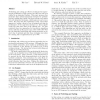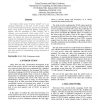862 search results - page 36 / 173 » Optimal task placement to improve cache performance |
GECCO
2004
Springer
15 years 5 months ago
2004
Springer
Low diversity in a genetic algorithm (GA) can cause the search to become stagnant upon reaching a local optimum. To some extent, non-stationary tasks avoid this problem, which woul...
SIGMETRICS
1995
ACM
15 years 3 months ago
1995
ACM
Prefetching and caching are e
ective techniques for improving the performance of
le systems, but they have not been studied in an integrated fashion. This paper proposes four pro...
ESCIENCE
2007
IEEE
15 years 6 months ago
2007
IEEE
The emergence of computational grids has lead to an increased reliance on task schedulers that can guarantee the completion of tasks that are executed on unreliable systems. There...
ICWS
2003
IEEE
15 years 1 months ago
2003
IEEE
The Simple Object Access Protocol (SOAP) [1] is an emerging technology in the field of web services. Web services demand high performance, security and extensibility. SOAP, being ...
116
click to vote
RTAS
2010
IEEE
14 years 10 months ago
2010
IEEE
—Hardware-managed caches introduce large amounts of timing variability, complicating real-time system design. One alternative is a memory system with scratchpad memories which im...


